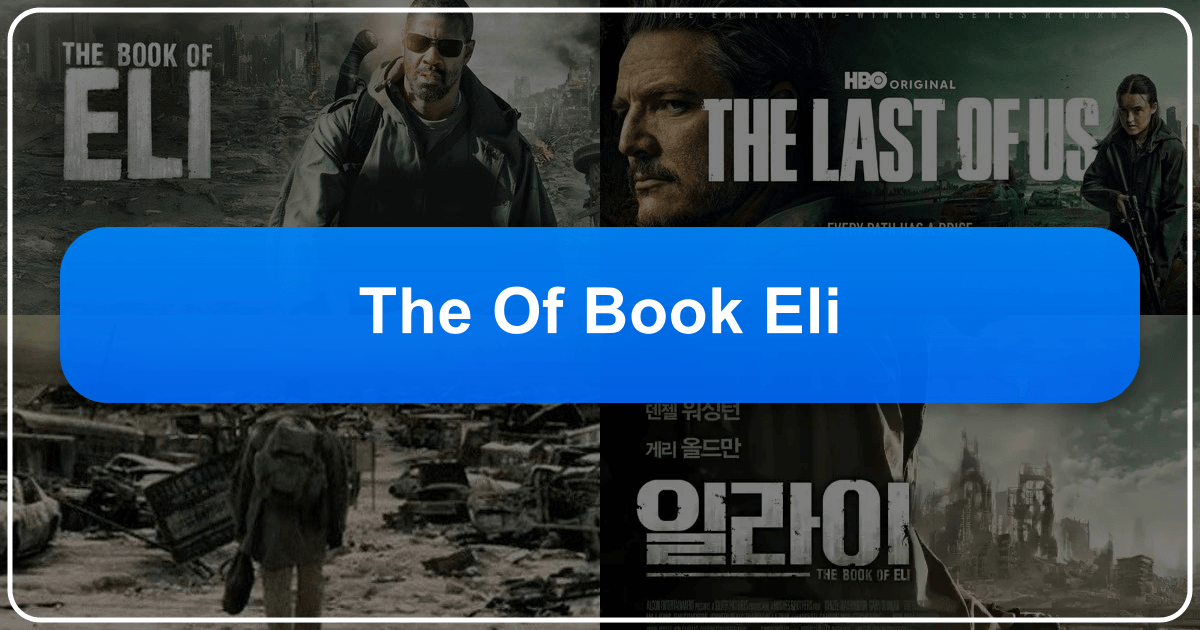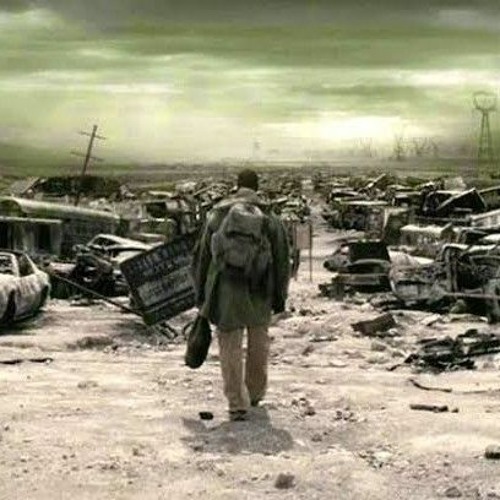The Book of Eli: A Post-Apocalyptic Literary and Cinematic Journey

The Book of Eli, a 2010 American post-apocalyptic neo-western action film, transcends its genre classifications to become a compelling exploration of faith, survival, and the enduring power of literature in a desolate world. Directed by the Hughes brothers and starring Denzel Washington in the titular role, the film’s narrative unfolds across a ravaged American landscape, thirty years after a nuclear holocaust. This essay will examine “The Book of Eli” through the lenses of several key thematic areas: books and their genres, the authorial vision, the educational value and life lessons presented, the role of libraries in preserving knowledge, and the film’s enduring cultural impact.
The Genre of “The Book of Eli” and its Literary Precursors
“The Book of Eli” occupies a unique space within the post-apocalyptic genre. While sharing common ground with other works depicting a world devastated by nuclear war (like A Boy and His Dog, The Road, and 2012), it incorporates elements of the neo-western, emphasizing themes of lone heroism and a journey across a lawless frontier. The film’s visual aesthetic, with its bleached-out palette and expansive desert landscapes, strongly evokes classic western films, creating a sense of timeless struggle.

The film’s central narrative device—the preservation and transmission of a sacred text—echoes numerous biblical and mythological narratives involving prophets and guardians of sacred knowledge. The parallels to the Old Testament, specifically the story of Moses carrying the tablets of the Ten Commandments, are clear. Eli’s journey, his unwavering commitment to his mission, and the persecution he faces mirror the archetypal hero’s journey found throughout literature and mythology. This allusion to enduring religious texts elevates the film beyond a mere action story, embedding it within a much richer tradition of storytelling centered on the preservation of spiritual and cultural heritage. The book itself, revealed to be the King James Bible, acts as a powerful symbol of hope and cultural memory, a beacon in a world where such things have almost vanished entirely.
The film’s script, written by Gary Whitta, is deliberate in its pacing, focusing on building suspense and revealing information gradually. While the central conflict—the struggle for possession of the Bible—is relatively straightforward, the film masterfully builds on the mystery surrounding Eli’s character and his mission. This deliberate unveiling of the plot mirrors many classic mystery and thriller narratives where the suspense builds through carefully constructed revelations.

Beyond its obvious genre influences, “The Book of Eli” engages with broader literary themes of faith, redemption, and the human spirit’s ability to endure even in the face of unimaginable hardship. The film invites comparisons to works exploring the ethical dilemmas of survival and the resilience of the human spirit, prompting reflection on the value of empathy, compassion, and hope in a world stripped bare of its former comforts.
The Authorial Vision and Inspirations Behind the Film
While the Hughes brothers directed the film, Gary Whitta’s screenplay provides the primary creative vision. Whitta’s background as a successful screenwriter is reflected in the film’s well-constructed narrative, its compelling characters, and its tight pacing. The film doesn’t linger unnecessarily on exposition; instead, it trusts its audience to piece together the details of the post-apocalyptic world through careful observation and implication.

The film’s post-apocalyptic setting, while a common trope, is used to explore universal themes rather than dwell on the specifics of the apocalypse itself. This broad stroke allows the film to resonate with viewers irrespective of their familiarity with other post-apocalyptic stories. The ambiguity surrounding some aspects of the world’s demise allows the audience to focus on the human drama, the moral choices, and the spiritual implications of the characters’ actions.
The film draws inspiration from both cinematic and literary sources. The neo-western elements evoke classic Westerns like The Good, the Bad and the Ugly and Shane, while the post-apocalyptic setting echoes the dystopian visions of authors like Cormac McCarthy (The Road) and George Orwell (Nineteen Eighty-Four). The film’s blend of genres and thematic elements reflects a deliberate effort to create a unique and thought-provoking cinematic experience.
The casting of Denzel Washington is crucial to the film’s success. His iconic screen presence brings a sense of gravitas and mystery to the role of Eli, imbuing the character with both formidable strength and surprising vulnerability. Washington’s performance anchors the narrative, making Eli’s journey relatable and emotionally resonant.
Educational Value and Life Lessons in “The Book of Eli”
“The Book of Eli,” despite its action-oriented presentation, offers numerous opportunities for reflection on various themes. The film can be used as a springboard for discussions on the importance of preserving cultural heritage in the face of adversity, the significance of faith and hope, and the consequences of unchecked power.
The film’s central theme of preserving knowledge is particularly relevant in today’s world, where information is easily accessible but also vulnerable to manipulation and loss. Eli’s relentless pursuit of his mission underscores the need for custodians of knowledge and the vital role they play in shaping future generations. The film inspires contemplation on the fragility of civilization and the importance of protecting cultural artifacts and narratives that define a society.
The character of Eli himself offers a valuable lesson in perseverance, selflessness, and unwavering faith. His journey is not easy, yet he remains resolute in his commitment, even in the face of insurmountable odds. This portrayal of steadfast devotion teaches viewers the importance of dedication to a higher purpose and provides a powerful example of resilience.
The contrasting characters of Eli and Carnegie provide a stark illustration of the potential destructive consequences of unchecked power and the seductive allure of self-interest. Carnegie’s ambition and ruthless pursuit of the Bible demonstrate the corrosive effects of greed and the importance of ethical leadership. This thematic dichotomy creates a powerful moral framework that informs the narrative and prompts reflection on individual choices and consequences.
Libraries and Archives: Preserving Knowledge in a Post-Apocalyptic Context
The film’s climax reveals a hidden library and archive on Alcatraz Island, showcasing the efforts of a community dedicated to preserving literature and music. This location is symbolically significant, representing the preservation of humanity’s cultural and intellectual heritage. The existence of this safe haven reinforces the film’s central message on the enduring importance of preserving knowledge.
The film’s portrayal of this community on Alcatraz underscores the crucial role played by libraries and archives in protecting human civilization. These institutions, often overlooked in the everyday bustle of modern life, become vital centers of knowledge preservation during times of crisis. “The Book of Eli” serves as a potent reminder of the importance of supporting these institutions and protecting the collective wisdom and cultural heritage housed within their walls.
In the film, the library on Alcatraz represents a hope for the future, suggesting that even in the aftermath of devastation, the human spirit and its capacity to create, learn, and preserve knowledge will persist. The film uses this setting to suggest a possible future where cultural and literary treasures are not only safeguarded but also actively used to help humanity rebuild and rediscover its identity.
The film’s treatment of the library and archive can be viewed as a metaphorical representation of the responsibility shared by all of humanity to protect cultural treasures. This responsibility extends beyond physical books and artifacts to include intangible elements such as oral traditions, music, and other cultural expressions, which shape our collective consciousness and define our societies.
Cultural Impact and Adaptations of “The Book of Eli”
“The Book of Eli” enjoyed commercial success upon its release, generating significant revenue and generating considerable discussion amongst critics and audiences alike. While the film received mixed critical reviews, its exploration of relevant social and spiritual themes has secured its place in popular culture. The film’s success shows that stories about faith, survival, and the importance of human connection resonate deeply with audiences.
The film’s central themes have continued to inspire reflection and discussion in the years since its release. Its exploration of faith, resilience, and the enduring value of literature continues to be relevant, particularly in a world facing increasingly complex challenges. The film’s enduring cultural impact lies in its ability to engage with such timelessly relevant concepts through a visually stunning and narratively compelling framework. It serves as a reminder of humanity’s capacity for both destruction and creation, inspiring viewers to consider the choices they make and their impact on the future.
While there haven’t been direct adaptations of “The Book of Eli” beyond its original cinematic release, its influence can be seen in later post-apocalyptic narratives across various media. Its thematic preoccupations with faith, cultural preservation, and the ethics of survival have informed similar works in film, television, and video games, reflecting the film’s contribution to the evolving post-apocalyptic landscape.
In conclusion, “The Book of Eli” offers a rich tapestry of literary and cinematic influences, presenting viewers with thought-provoking themes and compelling characters. Through its exploration of faith, survival, and the preservation of knowledge, the film leaves a lasting impression, prompting reflection on the human condition and the enduring power of literature. Its integration of various genres and archetypal narratives solidifies its place as a significant work within the post-apocalyptic genre and a noteworthy contribution to popular culture.